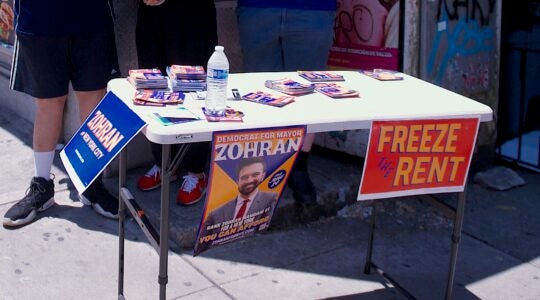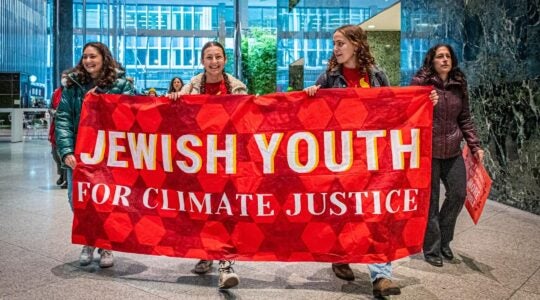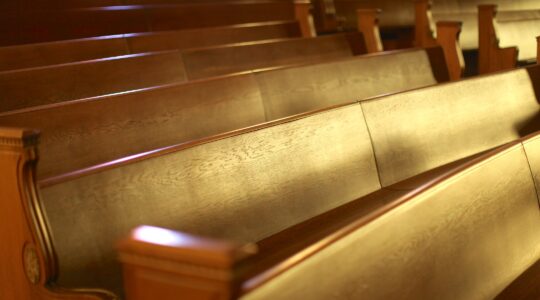On Sunday, as we marked Yom HaShoah, we entered upon a stretch of days in their own right as defining for Jews as those that separate Rosh HaShanah from Yom Kippur. On May 6, we celebrate the 66th anniversary of Israel’s independence. Every year, I am struck by how the observance of Yom HaShoah enhances the significance of Yom Ha’Atzmaut. Each is made more meaningful (if one can say such a thing) by the other. This year, the hate-inspired pre-Passover murders of three innocents outside Jewish facilities in Overland Park, Kan., and the fear for Jews in eastern Ukraine, lend Holocaust Remembrance Day an unusual pertinence and gravity. And our observance of Israeli Independence Day — the joy or the concerns we bring to it — will no doubt be shaped by the dim prospects for an Israeli-Palestinian peace.
Jewish life is filled with liminal moments: moments when we stand at a threshold between one way of living in the world, and another. The Yamim Noraim, the Days of Awe, are one such liminal moment: In the decisions we contemplate, we stand between the prospects of spiritual death and spiritual renewal. The days between Yom HaShoah and Yom Ha’Atzmaut hold for us the remembrances of near annihilation and renewed life for our people.
And today, I fear we American Jews stand at another threshold, this one a precarious precipice: Our degenerating intra-communal dialogue (if one can call it that) concerning Israel threatens to undermine both Israel’s international standing and our own hopes for unity at a time when we need it more than ever.
In recent years, the strain within American Jewry has manifested itself perhaps most visibly in our own hometown, in the controversy surrounding the Celebrate Israel parade. On June 1, the 50th anniversary march will pass by the doors of Temple Emanu-El on its way up Fifth Avenue. But once again this year a group of critics is charging the Jewish Community Relations Council of New York, the parade’s chief sponsor, with including anti-Israel organizations among the marchers — specifically the New Israel Fund, Partners for Progressive Israel (formerly Meretz USA) and B’Tselem, a human rights organization.
The anti-Israel charge leveled at these groups stems from their support for a targeted boycott of products from the West Bank. To be clear, I oppose such an effort. Targeted boycotts and divestment do not work with a scalpel’s accuracy. They threaten to undermine Israel’s broader economy, which even those who claim to have the Palestinians’ best interest at heart should know would hurt the Palestinians, too. But to call these groups anti-Israel is slanderous, and draws our attention away from the real danger that lurks: a global BDS (Boycott, Divestment and Sanctions) effort against Israel itself.
We in the leadership of the Jewish community have a responsibility to speak out in defense of Israel. In its release of prisoners, including those who murdered Israeli citizens, the nation’s leadership has accepted painful compromises to keep the peace process afloat, while the Palestinian leadership refuses compromise on “the right of return.” Liberal Jews (I am one) cannot be so committed to our liberalism — our willingness to hear and understand both sides of every argument — that we straddle the 50-yard line in this debate. Israel’s existence as a Jewish state is not some theoretical geopolitical exercise; it is an existential necessity, no less for us than for those who fled Europe to build it 70 years ago.
But we also must not tolerate those within the American Jewish community so blinded by their fundamentalism — such as these groups who would tar with the same brush every organization which challenges the policies of the Israeli government — that they cannot see the forest for the trees. The leadership of the American Jewish community needs to acknowledge that those who occupy its far right wing are just as dangerous to Israel as those who stand on its far left. While we should have zero tolerance for a organization like Jewish Voice for Peace, which calls for the suspension of U.S. military aid to Israel, neither should we have any truck with those on the far right who would attempt to derail the peace process, which may be Israel’s last hope to remain a Jewish democracy.
Extremists on both sides have been permitted to define the parameters of debate, fueling, for example, the misperception that J Street and AIPAC are somehow diametrically opposed to one another’s policies. Yes, their agendas are different. AIPAC plays an essential role guaranteeing U.S. support for Israel in the halls of Congress. J Street has a broader social justice mission. Most American Jews support both ends. Let the leadership of J Street speak to the far left and remind them that the BDS movement, which J Street does not support, endangers Israel. Let the leadership of AIPAC speak to its right flank and remind them that a peace agreement involving compromise, which AIPAC does support, is absolutely critical. J Street and AIPAC did not create the divide within the American Jewish community we are now experiencing, but unlike any other voices among us, they may have the ability to help bridge it.
We have reached what I believe is a precarious moment in American Jewish life. Our ability to stand united in support of Israel depends on our ability to stand united ourselves, and that rests on our willingness to carve a consensus approach to Israel and its future course.
The hope of the organizers of the Celebrate Israel parade has always been that we could for one day set aside our differences and simply celebrate our Jewish homeland — a goal to which we should aspire. In the meantime, if we can demonstrate leadership in marginalizing inappropriate and counterproductive behaviors, then perhaps the 80 percent of us who share a vision for that land we love will be able to march together toward a more hopeful future.
Rabbi Joshua Davidson is the senior rabbi of Temple Emanu-El in Manhattan.
The New York Jewish Week brings you the stories behind the headlines, keeping you connected to Jewish life in New York. Help sustain the reporting you trust by donating today.





